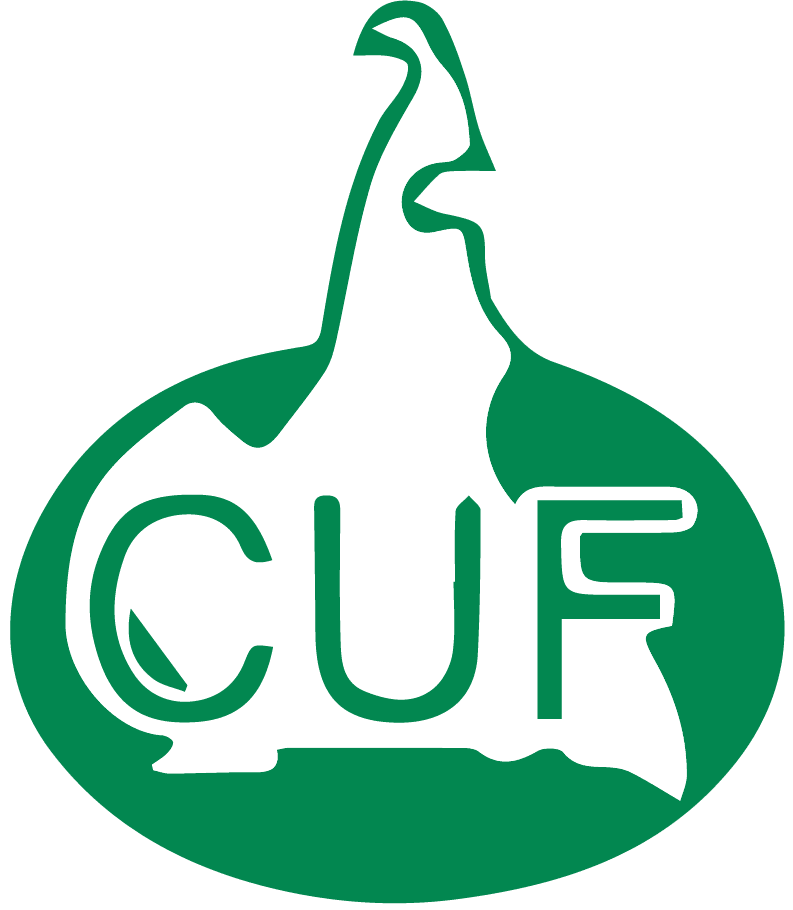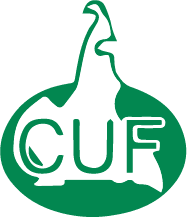Traceability, Legality, and Sustainability
Timber Origin and Legality
OLB certification is the recognition of the legality of the conditions of wood operation and their monitoring in the industry.
CUF is certified OLB for all its forests in ownership or in partnership. This certificate confirms that CUF respects national laws and regulations concerning forest management and operation, social and environmental aspects, and maintains a tracking system for wood from the forest to the sale.
It also has an OLB CoC (chain of custody) certificate for its productions of sawn and dried wood at the industrial site of Ebolowa, as well as for the dried wood at the industrial site of Mbalmayo.
This label provides the guarantees requested by a growing number of customers (particularly in Europe and the United States) regarding the legal origin of the wood and its traceability from the production forest to the importing customers. A one-week surveillance audit is carried out each year by a Bureau Veritas team, as well as a complete reassessment (renewal audit) every 5 years.
Computerized Forest Information Management System (SIGIF 2)
In Cameroon, the Ministry of Forests and Wildlife (MINFOF) has developed a second-generation computerized forest information management system (SIGIF 2).
The traceability system of SIGIF 2 relies on a complete logging inventory, a resource location system, a physical identification system (marking of logs), and documentary tracking of wood (computerized monitoring) at all stages of operations: logging, skidding, transport, processing, storage, and shipping. This platform allows for monitoring each stage of forest operation from the authorization of operation to the export of wood. It also includes the management of forest taxation and CITES permits. This computerized tool used by all local operators is a guarantee of reliability and transparency for importing clients by ensuring the legality of wood and the sustainable management of forests by the operator.
Convention on International Trade in Endangered Species of Wild Fauna and Flora
Cameroon ratified CITES in 1981, which is an international agreement aimed at ensuring that international trade in wild animal and plant species does not threaten their survival.
Several species of Cameroonian wood are listed in Annex 2 of the convention, which concerns non-threatened species of extinction but could become so without strict control of their trade.
Cameroon United Forests must therefore obtain a CITES export permit for the export of these species. This permit is a new guarantee for the client of the legality and sustainability of imported forest products.
EUTR and EUDR
The European Union Timber Regulation (EUTR) in force since 2013, requires European operators to ensure that timber imported into the EU market comes from legal sources by requiring strict traceability and proof of compliance throughout the supply chain.
By 2025, the EUTR will be replaced by the European Union Zero Deforestation Regulation (EUDR), which will expand these requirements by integrating social and environmental criteria to ensure that imported products do not contribute to global deforestation.
CUF has always been able to support its import clients in achieving compliance with the EUTR. Through rigorous management of its operations, the use of SIGIF 2, and the achievement of OLB certification, CUF guarantees its partners certified wood products that comply with legal requirements. Anticipating the arrival of the EUDR, CUF is already working with its clients to integrate the new requirements of the European regulation. This proactive approach demonstrates CUF’s commitment to sustainable and responsible trade, in line with the expectations of its partners and international regulatory improvements.
Environmental policy
At Cameroon United Forests, respect for the environment is a priority at every stage of our activity.
Firstly, the impact study carried out prior to obtain the operation permit makes it possible to identify the environmental issues of the forest concession, to identify the potential impacts of future operation and to define measures to avoid, reduce or even compensate for these impacts.
The management plan, which defines the conditions for sustainable operation in light of the forest potential (demarcation of plots, harvestable species, minimum harvesting diameters, duration of rotations), also includes environmental protection measures.
During logging operations, our field teams are made aware of the need to respect these measures aimed at ensuring the protection of soil, water, and carbon resources. These include the storage of lubricants in retention areas to collect any hydrocarbon leaks and prevent any soil pollution, the collection of used oils and scrap metal for transmission to recycling facilities, the installation of garbage bins at regular intervals to ensure waste collection, the optimization of logging truck routes, etc. At the sawmill, we can note the suction of sawing residues and the watering of tracks to limit dust emissions into the air, and the local resale of non-exportable wood waste.
Regular internal audits and annual audits conducted by Bureau Veritas ensure compliance with our environmental commitments. These evaluations allow us to adjust our practices for continuous improvement of our environmental performance.
Furthermore, areas disturbed by logging can benefit from reforestation. The Management Unit of CUF has set up a plant nursery on its site in Ebolowa with a capacity of 14,000 plants, allowing for enrichment. The logged species as well as the rare species in the operated plot are replanted.
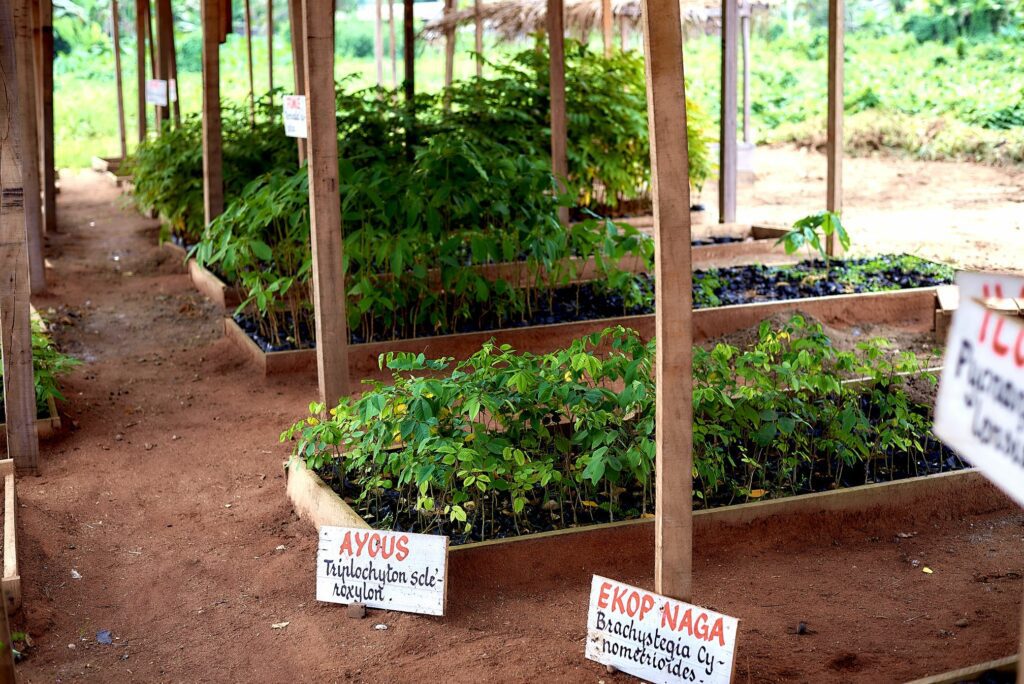
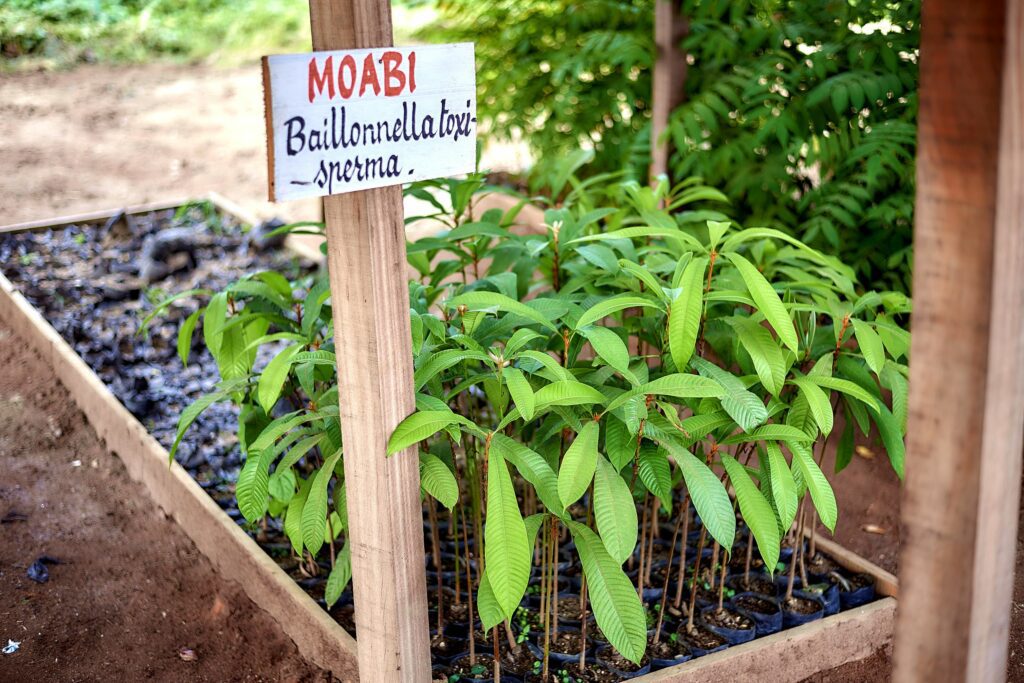
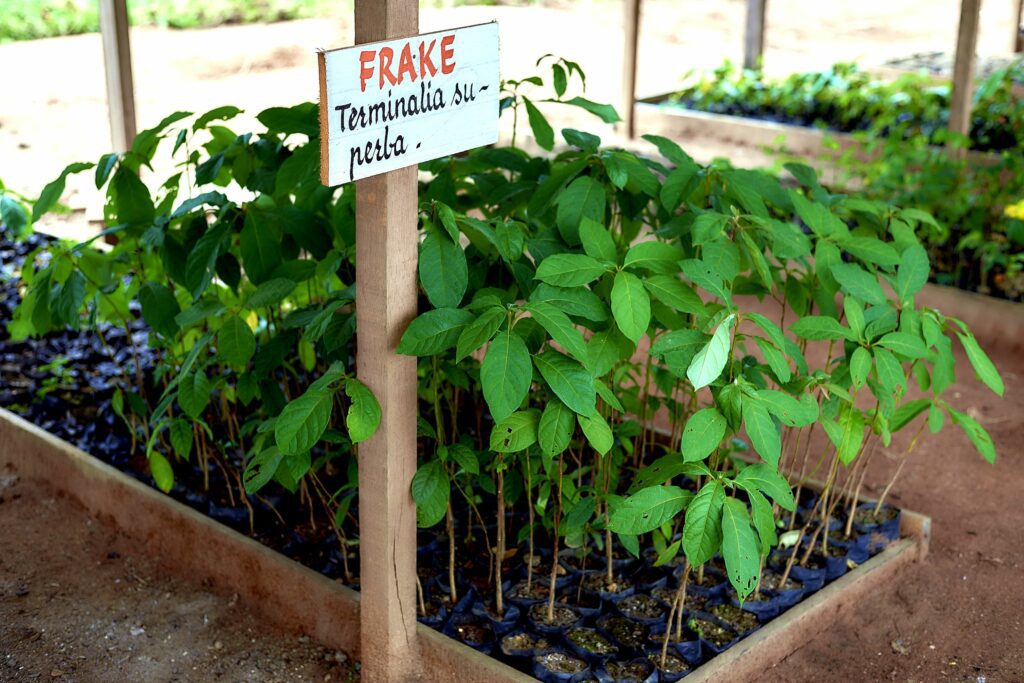
Focus on the plant nursery:
The plant nurseryman uses seeds or wildlings, young shoots of trees, collected in the forest. The seeds are placed in a germinator for three weeks and then taken out for phytosanitary treatment and potted. The wildlings collected in the forest are directly potted. The plants can be reforested starting from 50 cm.
The reforestation of the forest contributes to the regeneration of the forest, which occurs both naturally with the retention of minimum harvesting diameter trees left standing during logging, and with the growth from seeds or seed-bearing trees left during logging that disperse their seeds during logging.
Social Policy
As part of the implementation of its social policy, CUF has established a social team responsible for maintaining a permanent consultation with local communities. CUF contributes to the creation of functional communication and awareness platforms between the administration, the concessionaire, and the populations via the Peasant Forest Committees (CPF) and Riverside Committee (CR).
Functionally, the social team works in the activity zones of the communities, relying on:
- Participatory mapping that allows identifying the activities carried out by the riverside populations and the sites of interest to protect within the annual assessments of logging, in order to account during the operations;
- A mechanism for prevention, management, and resolution of disputes and conflicts, to ensure the maintenance of good relations between CUF and local communities ;
- A system aimed at obtaining the Free, Prior, and Informed Consent (FPIC) of local communities before the implementation of activities that have a direct or indirect impact on their rights;
- A mechanism contributing to the respect of social obligations in accordance with the regulatory provisions in force. In addition to the annual Forest Revenues Sharing (RFA) that benefit the territorial communities and local communes, it contributes to the socioeconomic achievements of the riverside communities, through respect for financial commitments and social achievements retained and recorded in the minutes of the information meeting preceding the start of logging activities. CUF’s contribution allows financing sports equipment, the rehabilitation or construction of school buildings and shelters, the purchase of maintenance equipment, the electrification of villages, etc.
Beyond compliance with legal obligations, CUF Contributes equally:
- to local economic development by promoting the recruitment of employees from the area of operations.
- to periodic maintenance of certain segments of the national road network and artworks, including refurbishments, rehabilitations of certain wooden bridges, openings of agricultural tracks for the benefit of communities, etc.
Furthermore, CUF also responds to occasional requests from associations supporting disadvantaged populations, particularly in the SOUTH region, by financing their donation distribution campaigns or the cultural activities they organize.
Health and Safety
The safety and health of CUF employees are at the heart of the company y’s priorities. With more than 1,100 collaborators, CUF implements strict measures to ensure a safe and fulfilling work environment.
To ensure their well-being, the company provides its employees:
- Individual protective equipment (helmets, safety shoes, boots, coats, etc.), periodically renewed. Their use is mandatory on all operational sites.
- Regular training to reinforce good practices in terms of safety.
- Easy access to healthcare (a clinic on the Ebolowa site) and housing.
A permanent dialogue between employees and management for continuous improvement of working conditions.
Moreover, several Quality, Hygiene, Safety, and Environment (QHSE) committees are active within CUF to ensure the rigorous application of current standards.
A Comic Strip Dedicated to Safety
To raise awareness among its employees about good safety practices in a fun and accessible way, CUF has also created a series of comic strips depicting common work situations adapted to local Cameroonian challenges. These episodes clearly and engagingly illustrate the behaviors to adopt to prevent risks (Read the comic strip).
